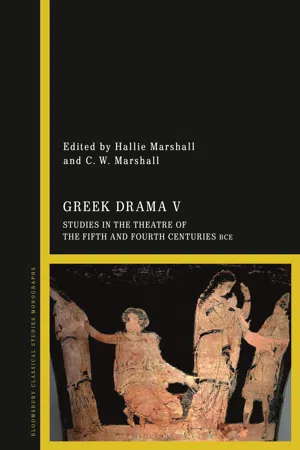
Greek Drama V
Studies in the Theatre of the Fifth and Fourth Centuries BCE
- 280 pages
- English
- ePUB (mobile friendly)
- Available on iOS & Android
Greek Drama V
Studies in the Theatre of the Fifth and Fourth Centuries BCE
About this book
Drawing together new research from emerging and senior scholars, this selection of papers from the decennial Greek Drama V conference (Vancouver, 2017) explores the works of the ancient Greek playwrights and showcases new methodologies with which to study them. Sixteen chapters from a field of international contributors examine a range of topics, from the politics of the ancient theatre, to the role of the chorus, to the earliest history of the reception of Aeschylus' Oresteia. Employing anthropological, historical, and psychological critical methods alongside performance analysis and textual criticism, these studies bring fresh and original interpretations to the plays. Several contributions analyse fragmentary tragedies, while others incorporate ideas on the performance aspect of certain plays. The final chapters deal separately with comedy, naturally focusing on the plays of Aristophanes and Menander. Greek Drama V offers a window into where the academic field of Greek drama is now, and points towards the future scholarship it will produce.
Frequently asked questions
- Essential is ideal for learners and professionals who enjoy exploring a wide range of subjects. Access the Essential Library with 800,000+ trusted titles and best-sellers across business, personal growth, and the humanities. Includes unlimited reading time and Standard Read Aloud voice.
- Complete: Perfect for advanced learners and researchers needing full, unrestricted access. Unlock 1.4M+ books across hundreds of subjects, including academic and specialized titles. The Complete Plan also includes advanced features like Premium Read Aloud and Research Assistant.
Please note we cannot support devices running on iOS 13 and Android 7 or earlier. Learn more about using the app.
Information
CHAPTER 1
THE POLITICS OF GREECE’S THEATRICAL REVOLUTION, c. 500–c. 300 BCE
Table of contents
- Cover
- Half-Title Page
- Dedication
- Series Page
- Title Page
- Contents
- List of Illustrations
- List of Contributors
- Preface
- Note on Transliteration and Names
- 1 The Politics of Greece’s Theatrical Revolution, c. 500–c. 300 BCE
- 2 Selective Memory and Epic Reminiscence in Sophocles’ Ajax
- 3 Elegy and Sophocles’ Philoctetes: A Reflection on Generic Resonance
- 4 A Dramaturgy of the Self: Deianira between the Grid and the Couch
- 5 Tragic Overliving and Deferred Funerary Ritual in Euripides’ Hecuba
- 6 Affective Suspense in Euripides’ Electra
- 7 The Fall of Troy, the Glory of Athens: Chorus and Community in Euripides’ Trojan Women
- 8 Choral Mirroring in Euripides’ Phaethon
- 9 Erōs in Pieces (?): Tragic Erōs in Euripides’ Andromeda and Antigone
- 10 The Case against Domestic Seclusion in (Euripides) fr. 1063
- 11 Aeschylus and the Iconography of the Erinyes
- 12 The Women of Thebes as Aeschylean Erinyes: The First Messenger Speech of Euripides’
- 13 Electra-style: Reception(s) of Aeschylus’ Oresteia in Aristophanes’ Clouds
- 14 Making Terminology: Genre Designations in Old Comedy
- 15 Stratophanes the Ephebe? The Hero’s Journeys in Menander’s Sikyonioi
- 16 The Pre-History of the Miles Gloriosus in Greek Drama
- Bibliography
- Index
- Copyright